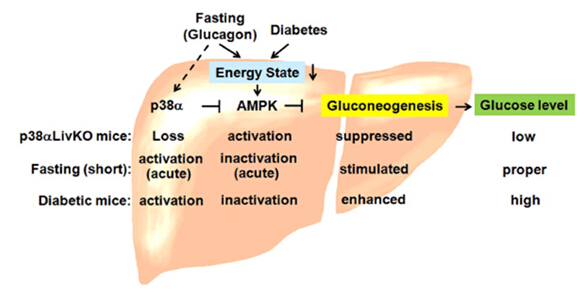
p38 mitogen-activated protein kinases are a class of mitogen-activated protein kinases that are responsive to stress stimuli and are involved in cell differentiation, apoptosis and autophagy. Gluconeogenesis is a metabolic pathway that results in the generation of glucose from non-carbohydrate carbon substrates.
Hepatic gluconeogenesis is critical to maintain blood glucose levels in a normal range and supply sufficient energy for glucose-dependent tissues. However, dysregulation of gluconeogenesis is believed to be one of the major factors that contribute to metabolic disorders such as type 2 diabetes. It has been proposed that p38 is involved in the regulation of gluconeogenesis, but the precise mechanisms remain poorly understood.
A team of scientists led by Dr. YING Hao from the Institute for Nutritional Sciences (INS), Shanghai Institutes for Biological Sciences of Chinese Academy of Sciences found that the activity of p38 is associated with the nutritional states. Collaborating with Dr. HUI Lijian at the Institute of Biochemistry and Cell Biology, they found that mice with liver-specific deficiency of p38α had a lower blood glucose level and impaired gluconeogenesis. Inhibition hepatic p38 activity resulted in the same phenotype.
The researchers found that hepatic deficiency of p38α led to an increase activity of AMP-activated kinase (AMPK). Inhibiting AMPK activity could abolish the effect of p38 inhibition on gluconoegenesis. Transforming growth factor b-activated kinase 1 (TAK1) is the upstream kinase of both p38 and AMPK. Knockdown TAK1 also decreased the AMPK activity induced by p38 inhibition which suggests a negative feedback loop. Repression of hepatic p38 also could ameliorate fasting hyperglycemia in diabetic mouse models, indicating that hepatic p38α represents an exciting pharmacological target for the treatment of hyperglycemia.
This work entitled “Hepatic p38α regulates gluconeogenesis through suppressing AMPK” has been published on Journal of Hepatology.
This work was supported by research grants from the Ministry of Science and Technology of China, the National Natural Science Foundation of China, Shanghai Institutes for Biological Sciences, Chinese Academy of Sciences and other funding.

Figure: Schematic representation for the role of hepatic p38a in gluconeogenesis in response to metabolic stress under physiological and pathological condition (Image by Dr. YING Hao’s group)

86-10-68597521 (day)
86-10-68597289 (night)

52 Sanlihe Rd., Xicheng District,
Beijing, China (100864)

